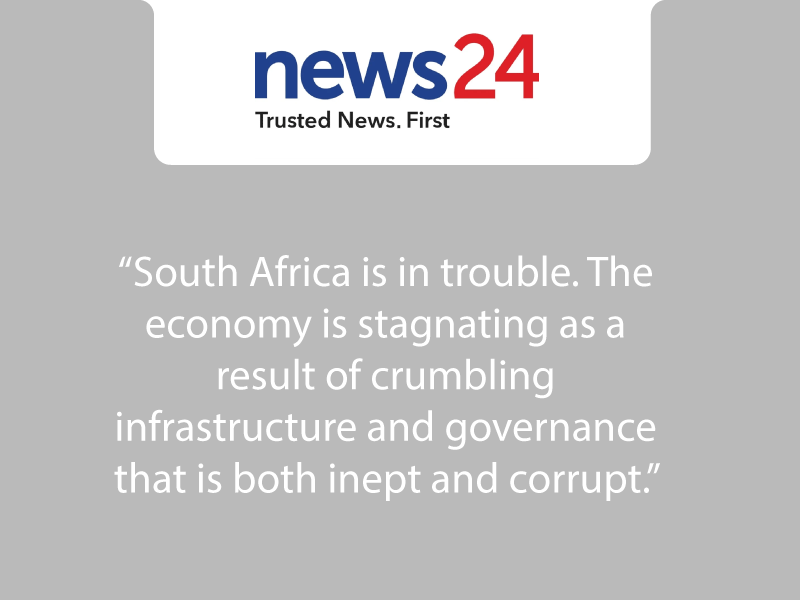
The Minister of Finance expects the economy to grow at an average of 3.5 percent per year over the next three years. The implications of this figure come close to being a national disaster. Unless we are able to achieve 5 to 6 percent growth per year sustained over a long period, we are not going to be able to reduce the backlog of unemployment and poverty. South Africa’s ‘miracle’ depends on sustained economic growth.
Continued racial reconciliation, the upliftment of the poor, the reduction of racial inequality, sustainable rural and urban development – all these and many other goals depend on rapid economic growth and improved job creation.
Government successes in important areas notwithstanding, South Africa has really limited capacity to get things done. Government’s reach exceeds its grasp. Its time to make some tough choices.
A recent roundtable discussion of private sector leaders, economists and government advisers came up with frank and constructive responses to the question of Why South Africa is failing to get the growth and jobs that we need? The discussion revealed three areas of critical concern – government has failed to achieve business confidence, too many government priorities lead to failure, the country faces a growing shortage of skills with devastating implications.
South African businesspeople are not sure the country provides the best place in which to commit their capital and themselves over the long term. The reasons – government regulations cost too much; inflexible labour market increases costs and hassles; essential infrastructure and institutional efficiency are deteriorating, with enormous implications for business; there have been too many changes too quickly – over 500 changes to the regulatory environment for business in the past 6 years; an inefficient, declining justice system and unconvincing approach to combating crime; an intense focus on race leads to unease concerning minority inclusion in ‘the new South Africa’; and race is too often seen as more important than competence to deliver.
Government does not speak with one voice on growth and jobs as the benchmark for all government actions – national, provincial and local. The result – market friendly messages are frequently cancelled out by anti-market approaches and sentiments. Government now suffers from a growing credibility gap. Too many unfulfilled promises have led to public skepticism about ministers and their department’s capacity to deliver.
And yet almost every one of the obstacles identified by business to greater confidence and thus a higher growth rate is in the government’s power to change. There are four areas of action required if the country is to move onto a higher growth path – an inclusive new vision; a new governance paradigm; government must get rid of obstacles to growth and job creation; and we must combat poverty directly.
The country needs an inspiring, inclusive vision of where we are going and what kind of society we are trying to create. South Africans need common goals that all of us can subscribe to and work towards. The most important contribution South Africa can make to an African Renaissance is to be an economic and political success. The only way to do that is to implement the president’s goal of making South Africa the ‘world’s most promising emerging market’ and use this as the benchmark for all government decisions. All South Africans, black and white must feel they have an important part to play in making the country a success. Consistently inclusive gestures and actions by the president and other members of cabinet are urgently required. Government must seize the high ground and convince investors that it is really committed to market led development and has fully accepted all its implications.
Governance through comprehensive ‘transformation idealism’ and too rapid promotion of inexperienced people is not working. Government must recognize limits and choose a few initiatives that can be done well. The president must draw on the talents of all South Africans for senior positions. The business-government relationship must be deepened and mechanisms found to bring in private sector capacity with accountability and transparency to help achieve results. Government must professionalize its communications and stop underselling its own achievements.
Before new investment incentives are implemented the government should make sure that existing obstacles are removed. A business-government task force with a strategic plan and clear deadlines should be appointed to ensure that this happens – a confidence boosting act on its own. It is essential to build a political coalition for growth and ensure that the president has the diverse group of allies needed to back the tough decisions necessary for economic success and sustainable delivery.
The realities of long-term unemployment need to be directly addressed. It will take years of above average growth rates to provide the jobs, resources and opportunities that millions of people require. In the meantime we must ensure that poorer South Africans have a means of sustaining themselves. All over the world the idea of ‘hand outs’ as a form of poverty relief is being rejected. A far better route for South Africa would be large-scale public works projects. The country should aim to offer every South African who is willing to work an opportunity to participate in a project building infrastructure in our cities, towns and rural areas at a modest wage. This will involve scaling up on present efforts and require experienced management skills from the private sector.
The bottom line is this: if government is serious about a market-driven approach to growth and poverty reduction, it should employ the immense skills that it used in defeating apartheid to think through and then sell that approach to all its constituencies and audiences both locally and internationally. But you cannot be ambiguous about the market and still get results in a developing country. The people who lead South Africa have to believe that this is the only way to create a better life for all. They have to commit themselves wholeheartedly to market-led development and structure every government policy and signal around that choice.
We cannot be a world leader or continental champion for long if our own society is in trouble. South Africa needs its president at home – using his prestige and position to promote his own philosophy of disciplined work, persuading the country to make the hard choices necessary for growth and ensuring delivery.
- Ann Bernstein is the executive director of the Centre for Development and Enterprise.




